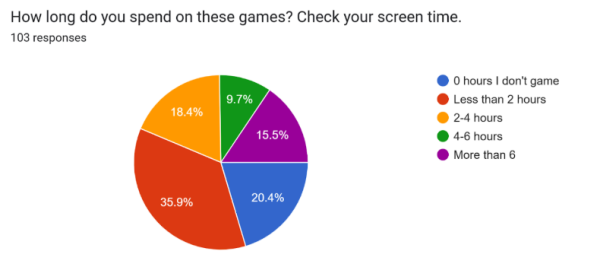A 0.01% chance to open the correct mystery box.
A 0.01% chance to make a gain.
And an almost 100% chance to lose the money you invest.
These are the odds gacha games ride on. Many see these games and the gambling that comes along with it as a source of emotional release. But in its true raw form it remains an addiction that consumes the lives of many high school students.
“I would find time to play [games] all the time,” sophomore Thrishathi Settibathini said. “Got to a point where I started doing quests of the game in my dreams. It got crazy.”
Settibathini notes how gambling has become an online culture and said that gambling is an easy “shortcut” to make gains in a game. In a survey conducted by the CHS RoundUp of over a 100 students, an anonymous junior said that gambling fills the “void” of “lack of emotional connection”.
“You feel you are a hero and you can sometimes be violent and think that’s a release of your emotion,” Chinese I and Algebra II teacher Lillian Li said. “A lot of games are online connected with your other people. In the real world, you might be very lonely. But in the virtual world, you might have a lot of friends and team members who are fighting together with you. You’re going to think it’s really cool and you don’t feel alone anymore.”
Out of the 64% of respondents who admitted to engaging in online gambling, only 38% felt that spending money on these games was worthwhile. Many respondents expressed feelings of addiction or dissatisfaction regarding their spending on gambling activities. Several commented that they believed students are drawn to gambling due to factors such as “impulsiveness,” “privilege,” “materialistic greed,” and, most notably, the desire for an “adrenaline rush” and a “sense of control and accomplishment.”
“I concede that there is a chance of losing money when it comes to gambling,” junior Ishaan Shah said. “When one loses money, they feel an urge to test their luck and bet again and again and again, until eventually one’s life is dictated by losing money.”
An anonymous freshman in the survey reports spending around $2000 on online assets in various video games. A different anonymous freshman reports that they have spent $3000 on online games since they were 7 years old.
“You have money to spend, then you spend on things you like,” Li said. “Young people are usually very impulsive. Today, most educational and actually fun games are free. The ones who charge money are actually the games which are addictive because that’s their goal. They hire many people, many programmers, and many storyline developers, and the sole purpose is to attract you into it.”

Although AP Biology teacher Joshua Cahal believes online gaming as a hobby is not necessarily a problem for most people, these games can become a “giant time sink”. The survey reports that 15.5% of the respondents play games online for more than six hours and 28.1% play games between two and six hours.
“I don’t think it’s one of those things that just anybody’s going to fall down this spiral into addiction,” Cahal said. “I think it’s like any kind of addiction, where some people are prone to it and some people aren’t. So it has a lot to do with maybe biology, lifestyle choices, and all sorts of other things that can make someone addicted to something.”
The sunk cost fallacy describes the phenomenon where individuals are reluctant to abandon a course of action due to the substantial investment they have already made, even if it would be more beneficial to do so. As Cahal points out, this is one reason why students continue to spend money on games, even when they are not seeing any returns.
“It is fine to spend money on video games if it’s something you enjoy, and it’s a reasonable amount,” Cahal said. “It’s not affecting you in any way. But with gacha games, they can kind of lead you into, oh, well, you can just spend a little money here and you can get this thing. But there’s always this next thing, so it can just build up, well, oh, just spend a little more.”
According to Cahal these games can take on a “predatory” nature. Due to the absence of spending limits, these games encourage players to invest significant amounts of money, often with the unrealistic expectation of a substantial return.
“You are one soul fighting from so many people who want your money, who want the money out of your pocket, so you’re weak,” Li said. “I think you need to realize that, they develop something you like, and they’re trying to attract you so you can spend more money on their platform, so they can hire more people and earn more money.”
Once someone falls in this spiral of gambling and online gaming, it is often very difficult to get out. Settibathini said that she stopped gaming online because she realized she was being associated with certain players within her online niches whom she couldn’t relate or agree with.
“I lost interest in these games after I saw the bad side of the community,” Settibathini said. “These people just overly spend their money and time, they don’t do anything else in life. Their whole personality is just playing this game.”
Settibathini and Li said that uninstalling apps can be a way to control an addiction to gambling. Settibathini said that if someone is going to spend money, then they should keep a budget and after that budget is done, they should not spend their money anymore.
“Gambling, as a recreation, you need to control yourself, self-discipline it,” Li said. “I think maybe you can talk to parents to figure out a reasonable screen time, and you have to first be friends with your parents on this. Have them understand this is unavoidable. You have to have a good relationship with your guardians instead of rebelling and giving up yourself.”
Even after talking to their parents, some people may be unable to control their urge to continue playing games and spending money on these games. Li said part-time jobs are one way to practice self control on your own.
“Start to earn money,” Li said. “Then you’ll know it’s not easy to earn that $50 that you change to buy a new skin. Then when you are in the real world and start to do real work and earn real money, then you’ll know that those are not easy, and you might not want to spend so much time on things like changing your skin.”
According to Cahal, addicted gamers can also try isolating the place where they indulge in playing to a controlled environment like their home.
“When I play video games, it’s always at the very end of the day,” Cahal said. “I don’t have time to play video games at any other time, but I have pretty much a set schedule. I think scheduling is a good way. You have a set schedule and then you’re like, okay, this is my game time, and that, I think that works, but definitely not having it on your phone.”
Li expresses that she is not optimistic about the problem of gambling ending in the future.
“They are still addicted to the computer online games because they need a company,” Li said. “They need a friendship, and they think it’s not cool being living alone. So I think having a mature personality is the most important thing. Then you’ll know what you need and what you don’t need.”










